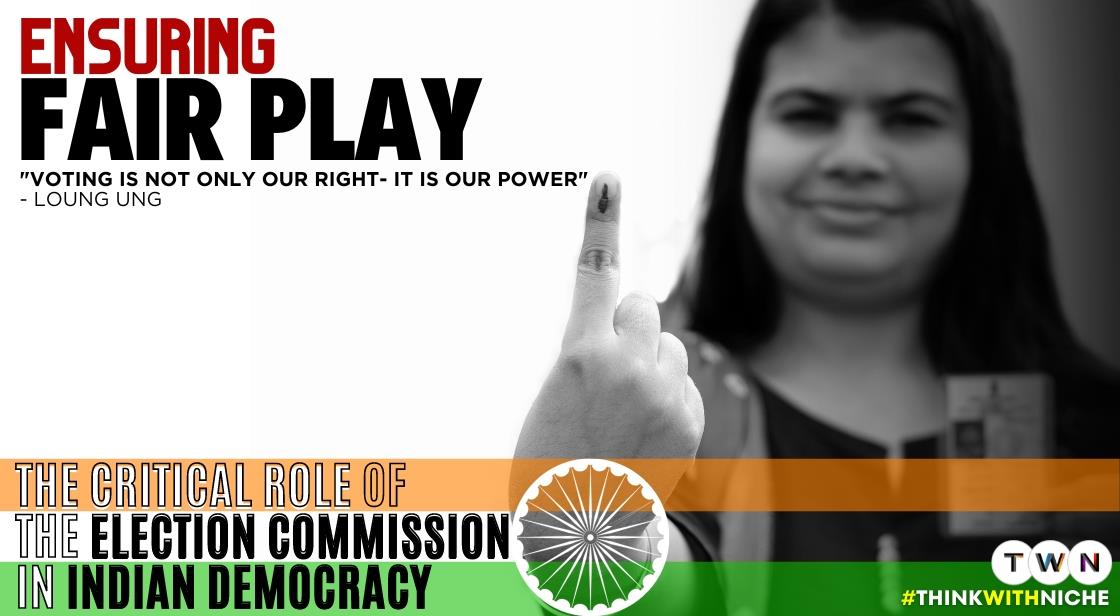The Critical Role of the Election Commission in Indian Democracy: Ensuring Fair Play

Blog Post
In the vibrant tapestry of Indian democracy, the Election Commission stands as a beacon of integrity, tasked with the monumental job of ensuring that the electoral process is conducted fairly, freely, and impartially.
The Election Commission of India (ECI) stands as the cornerstone of India's vibrant democracy. Established in 1950, this autonomous constitutional body is entrusted with the paramount responsibility of ensuring free and fair elections across the country.
The ECI oversees elections for the Lok Sabha and Rajya Sabha at the national level, as well as Legislative Assemblies and the offices of the President and Vice-President. With India's massive electorate, the ECI's role is crucial.
This blog post delves into the ECI's structure, powers, and its multifaceted functions, including maintaining a robust electoral roll, enforcing a level playing field through the Model Code of Conduct, and leveraging technology to enhance transparency and efficiency.
We will also explore the Commission's significance in upholding democratic values, promoting inclusivity, and fostering public trust in the electoral process.
As of March 13, 2024, the ECI functions as a multi-member body with a Chief Election Commissioner and two Election Commissioners. Recent Supreme Court judgements and ongoing discussions regarding appointment processes further highlight the ECI's evolving landscape.
By understanding the complex functioning of the ECI, we will gain a deeper understanding of its role as the guardian of Indian democracy.
This article delves into the multifaceted role of the Election Commission, highlighting its significance, challenges, triumphs, and the path it carves for a democratic India.
Exploring the Importance of the Election Commission in Indian Politics
What is the Election Commission?
The Election Commission stands as a pivotal constitutional body entrenched within the framework of India's democratic setup, established by the Constitution of India to ensure the conduct of free and fair elections. Often regarded as the custodian of the electoral process, the Election Commission of India assumes a central role in orchestrating the Lok Sabha elections, the cornerstone of India's parliamentary democracy.
Endowed with extensive powers enshrined in the Constitution, the Election Commission is vested with the authority to oversee, regulate, and govern elections to the Parliament, State Legislatures, as well as the esteemed offices of the President and Vice-President of India.
Functioning as a dual-entity overseeing both Central and State Government elections, the Election Commission holds a pivotal position in upholding the democratic ethos of the nation. While its jurisdiction extends to the conduct of elections at the national and state levels, it is pertinent to note that the Election Commission does not extend its purview to elections conducted at the municipal and panchayat levels across different states. For these local elections, the Constitution has laid down provisions for the establishment of separate election commissions.
With its unwavering commitment to maintaining the integrity and fairness of the electoral process, the Election Commission endeavors to ensure that the voice of the electorate resonates authentically through the ballot box. It stands as a beacon of democracy, tirelessly striving to uphold the sanctity of electoral democracy and safeguard the democratic principles enshrined in the Constitution of India.
Evolution of the Election Commission of India's Structure
The Election Commission of India (ECI) has undergone some structural changes since its inception in 1950. Here's a breakdown of its historical composition and the latest developments:
Early Years of Election Commission of India (ECI) (1950-1989):
-
Initially, the ECI was a one-member body led solely by the Chief Election Commissioner (CEC).
Expansion and Reversion of Election Commission of India (ECI) (1989-1993):
-
In 1989, to manage the increased workload associated with lowering the voting age from 21 to 18, the ECI was briefly expanded to a three-member body with two additional Election Commissioners appointed by the President.
-
However, in January 1990, the structure was reverted to a single-member commission with just the CEC.
-
Following concerns about workload and efficiency, the ECI became a three-member body again in October 1993.
Present Structure of Election Commission of India (ECI) (Post-1993):
-
Since 1993, the ECI has functioned as a multi-member body consisting of:
-
Chief Election Commissioner (CEC)
-
Two Election Commissioners
-
Who is the Chief Election Commissioner of India?
Mr. Rajiv Kumar is the Chief Election Commissioner of India,
Powers and Tenure:
-
All three commissioners enjoy equal powers and emoluments, including salaries equivalent to a Supreme Court judge.
-
Decisions are made by majority vote in case of disagreements between the CEC and other commissioners.
-
Commissioners hold office for a maximum of six years or until they reach the age of 65 years, whichever comes first.
-
They can also resign or be removed before their term ends.
Latest Development of Election Commission of India (March 2023 Supreme Court Judgement):
-
It's important to note a recent development impacting ECI appointments. In March 2023, the Supreme Court ruled that the President should appoint the CEC and Election Commissioners based on the advice of a committee consisting of:
-
Prime Minister
-
Leader of the Opposition in the Lok Sabha (or leader of the largest opposition party)
-
Chief Justice of India
-
This judgement is currently being challenged, and Parliament might enact a law to determine the appointment process in the future.
Also Read: Exploring the Cultural Splendors of Incredible India
Independence of the Election Commission
The Constitution of India, under Article 324, delineates provisions aimed at safeguarding and ensuring the independent and impartial functioning of the Election Commission. These provisions are instrumental in upholding the democratic principles and integrity of the electoral process in the country.
According to Article 324, the Chief Election Commissioner is granted security of tenure, which implies that they cannot be arbitrarily removed from office. Similar to the process for the removal of a judge of the Supreme Court, the Chief Election Commissioner can only be removed on the grounds of proven misbehavior or incapacity.
This removal can occur via a resolution passed by both Houses of Parliament with a special majority, ensuring a stringent and transparent process.
Importantly, the Chief Election Commissioner does not serve at the pleasure of the President, as they are appointed by the President but cannot be removed solely at the President's discretion.
Additionally, the service conditions of the Chief Election Commissioner cannot be altered to their disadvantage post-appointment, further bolstering their independence and autonomy.
Furthermore, the Constitution stipulates that any other Election Commissioner or Regional Commissioner can only be removed from office upon the recommendation of the Chief Election Commissioner, providing an additional layer of protection against arbitrary dismissal.
Despite these constitutional safeguards, certain shortcomings exist that warrant attention. Firstly, the Constitution does not specify the qualifications required for individuals appointed as members of the Election Commission, whether in terms of legal, educational, administrative, or judicial background. This lack of explicit criteria leaves room for ambiguity and potential discrepancies in the selection process.
Similarly, the Constitution does not establish a fixed term for the members of the Election Commission, leaving the duration of their tenure open-ended. This ambiguity can impact the stability and continuity of the Commission's functioning.
Moreover, the Constitution does not impose restrictions on retiring Election Commissioners from accepting further appointments by the government. This loophole raises concerns regarding the potential for conflicts of interest or undue influence in post-retirement engagements.
In conclusion, while the Constitution endeavors to safeguard the independence and impartiality of the Election Commission through specified provisions, addressing the identified flaws and implementing reforms could further fortify the Commission's integrity and efficacy in overseeing the electoral process in India.
Functions and Powers of the ECI:
Ensuring Free and Fair Elections: The ECI's Multifaceted Role
The Election Commission of India (ECI) plays a pivotal role in safeguarding the world's largest democracy. Here's a closer look at its key functions and powers, incorporating the latest information (as of March 13, 2024):
1. Conducting Elections: Scheduling, Polling, and Result Declaration
-
Election Schedule and Voter Notification: The ECI meticulously plans election schedules, ensuring ample notice for campaigning and voter registration. It recently introduced a "Phase-wise Notification System" for large states with staggered polling dates, allowing for more focused campaigning and resource allocation.
-
Deployment of Polling Personnel: The ECI oversees the training and deployment of polling personnel – presiding officers, polling officers, and security forces – across the vast geographical expanse of India.
-
Conducting Polling and Counting: The ECI conducts polling in a secure and transparent manner. It has taken proactive steps to improve accessibility, including setting up polling booths in remote areas and facilitating voting for persons with disabilities (PWDs). Counting of votes is also rigorously supervised by the ECI to maintain accuracy.
2. Maintaining Accurate and Inclusive Electoral Rolls
-
Continuous Voter Registration Drives: The ECI conducts year-round voter registration drives, leveraging mass media and online platforms like the National Voters' Service Portal (https://www.nvsp.in/). A special emphasis is placed on registering young adults upon reaching eligibility.
-
Eliminating Duplicate Entries: The ECI utilizes technology, including data analysis and inter-state verification, to identify and remove duplicate voter registrations, ensuring the integrity of the electoral rolls.
-
Facilitating Online Voter Registration: Recognizing the growing digital population, the ECI promotes online voter registration for convenience. This not only simplifies registration but also allows for easy address changes within the same constituency.
3. Enforcing the Model Code of Conduct (MCC) for a Level Playing Field
-
Guidelines for Political Parties and Candidates: The MCC, enforced by the ECI, outlines a set of guidelines that political parties and candidates must adhere to during elections. These guidelines promote fair campaigning by restricting hate speech, bribing voters, and misuse of government resources.
-
Maintaining Decorum and Preventing Malpractices: The ECI closely monitors adherence to the MCC. It has recently issued stricter guidelines on social media campaigning to curb the spread of misinformation and inflammatory content.
4. Dispute Resolution: Addressing Electoral Issues
-
Quasi-Judicial Role: The ECI functions as a quasi-judicial body to resolve disputes arising during the electoral process. This includes issues like:
-
Nomination Rejections: Candidates can appeal nomination rejections by the Returning Officer to the ECI.
-
Allegations of Electoral Malpractice: The ECI investigates claims of electoral malpractice, such as booth capturing or voter intimidation, and takes appropriate action.
-
-
Time-Bound Dispute Resolution: The ECI prioritizes swift and fair resolution of disputes to ensure that the electoral process is not unduly delayed.
5. Embracing Technology for Transparency and Efficiency
-
Electronic Voting Machines (EVMs): EVMs have significantly reduced the risk of human error in the voting process. The ECI regularly upgrades EVMs to incorporate the latest security features and ensure tamper-proof operation.
-
Voter Verifiable Paper Audit Trail (VVPAT): The VVPAT system provides a paper record of the vote cast, allowing voters to verify their selection on a paper slip before final confirmation. This enhances transparency and builds voter confidence.
-
Exploring Blockchain Technology: The ECI is actively exploring the potential of blockchain technology to further enhance the security and transparency of the electoral process.
By effectively executing these multifaceted functions, the ECI strives to ensure free, fair, and credible elections in India, the world's largest democracy.
Also Read: Dr. Bhimrao Ambedkar: A Warrior For Social Justice And Equality In India
Importance of Election Commission for India
1. Conducting Elections:
-
Since its establishment in 1952, the Election Commission has been responsible for overseeing both national and state elections, ensuring their smooth and efficient conduct.
-
Through meticulous planning and execution, the Commission facilitates the democratic exercise of millions of voters across the country.
2. Disciplining Political Parties:
-
The Commission imposes strict regulations and guidelines on political parties, including the threat of derecognition if parties fail to adhere to principles of inner-party democracy.
-
This fosters a culture of accountability and transparency within the political landscape, promoting greater integrity in the electoral process.
3. Upholding Constitutional Values:
-
The Election Commission is committed to preserving core constitutional values such as equality, equity, impartiality, and independence.
-
By exercising superintendence, direction, and control over electoral governance, the Commission ensures that elections remain fair, transparent, and free from undue influence.
4. Ensuring Credibility and Integrity:
-
The Commission conducts elections with the highest standards of credibility, fairness, and integrity, emphasizing professionalism and autonomy.
-
Upholding the sanctity of the electoral process, the Commission bolsters public trust and confidence in democratic institutions.
5. Promoting Inclusivity and Voter-Centricity:
-
The Election Commission works to ensure the participation of all eligible citizens in the electoral process, creating a voter-friendly environment and enhancing accessibility.
-
By empowering individuals to exercise their democratic right to vote, the Commission promotes inclusivity and voter-centricity.
6. Engaging with Stakeholders:
-
The Commission actively engages with political parties and stakeholders to solicit their input and cooperation in the electoral process.
-
By fostering dialogue and collaboration, the Commission seeks to build consensus and ensure the smooth functioning of the electoral machinery.
7. Raising Awareness:
-
The Election Commission plays a vital role in raising awareness about the electoral process and governance among various stakeholders.
-
Through educational initiatives and outreach programs, the Commission enhances understanding and confidence in the electoral system, strengthening the foundations of democracy.
Challenges and Triumphs of Election Commission
Navigating Through Political Waters: Challenges Faced
The path of the ECI is not without its hurdles. From managing the mammoth task of conducting elections across the diverse and populous landscape of India to dealing with attempts at electoral fraud, the Commission's resolve is constantly tested.
Tackling Electoral Fraud and Malpractices
The ECI has implemented stringent measures to curb electoral fraud and ensure that the democratic process is not compromised, maintaining a vigilant watch over the electoral landscape.
Enhancing Voter Education and Participation
Recognizing the importance of an informed electorate, the ECI has intensified its efforts in voter education, aiming to boost participation and make every vote count.
Milestones Achieved by the Election Commission
Despite the challenges, the ECI has celebrated numerous successes, marking milestones that have fortified Indian democracy.
Successful Elections That Shaped Indian Democracy
The seamless execution of national and state elections over the years stands as a testament to the ECI's efficacy and commitment to democracy.
Innovations and Reforms: A New Era of Electoral Processes
The Commission's openness to innovation and reform has ushered in a new era of electoral processes, making the Indian electoral system more resilient and inclusive than ever before.
FAQs:
- What is the primary function of the Election Commission of India?
- To administer and oversee all aspects of the electoral process, ensuring it is conducted fairly, freely, and impartially.
- How has technology impacted the electoral process in India?
- The adoption of EVMs, VVPATs, and digital platforms for voter registration and ID verification has made the voting process more secure, efficient, and accessible.
- What measures does the ECI take to increase voter participation?
- Through voter education campaigns, simplification of the registration process, and ensuring inclusivity, the ECI actively works to increase voter turnout.
Famous quotes on Power of Voting Rights
"The vote is the most powerful nonviolent tool we have." - John Lewis
"Democracy is not just the right to vote, it is the right to live in dignity." - Naomi Klein
"Every election is determined by the people who show up." - Larry J. Sabato
"Voting is not only our right—it is our power." - Loung Ung
"Bad officials are elected by good citizens who do not vote." - George Jean Nathan
Conclusion:
The Election Commission of India stands as the bedrock of India's democratic foundation, ensuring the sanctity and integrity of the electoral process. Through its multifaceted functions, the Commission upholds constitutional values, promotes inclusivity, and fosters public trust in democratic institutions.
As we navigate the dynamic landscape of Indian democracy, the Election Commission remains steadfast in its commitment to conducting free, fair, and credible elections, thereby safeguarding the essence of democracy for generations to come.
You May Like
EDITOR’S CHOICE












